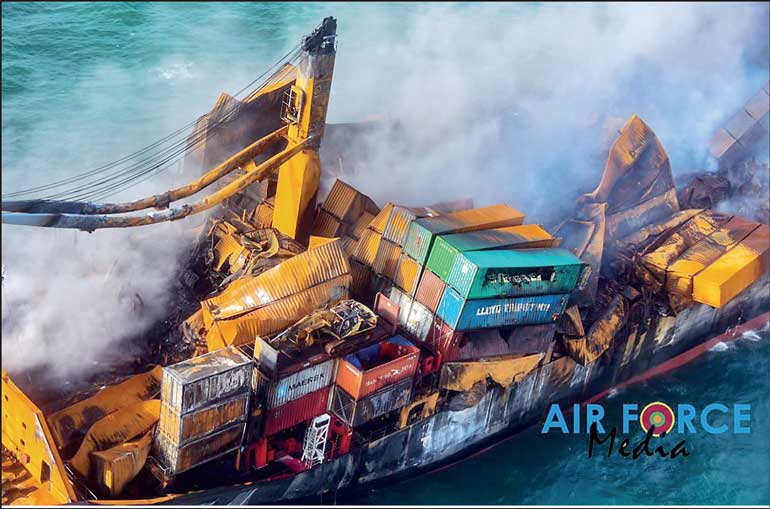Thursday Feb 19, 2026
Thursday Feb 19, 2026
Wednesday, 9 June 2021 00:00 - - {{hitsCtrl.values.hits}}

The X-Press Pearl has taught us a lesson: We must expect the unexpected. As a nation, we seem to think that disasters unexpected should not happen in our backyard. We are too much into the foundational myth about our cosmic credentials
 Events that unfolded in the week offer ample proof that we do not plan, prepare, or prevail. Ruminating in isolation makes you wise after the fact.
Events that unfolded in the week offer ample proof that we do not plan, prepare, or prevail. Ruminating in isolation makes you wise after the fact.
The vaccine rollout, haphazard, crony-driven and vulgarly discriminatory, has brought the nation to the edge of a moral abyss.
In the solitude of self-isolation, watching a ship on fire, listening to a Minister explaining how he proposes to distribute non existing compost manure, suffering the insolence of another Minister who insists that one jab would be better than the prescribed two for a person to survive the pandemic is not easy. But the Minister of Agriculture has a point. When ‘crap’ happens, making fertiliser is the wiser option.
But these are hard times. Retaining our moral insights is not easy. In addition to the virus, there is general lunacy on the loose.
Since we live cloistered in our homes, our socially-isolated choices reveal our inner souls. A dear friend got his second dose of the AstraZeneca vaccine due to the good fortune of having a doctor nephew. That forms the point of departure for these ruminations.
The ‘Wathera District Hospital’ is about thirty kilometres from Colombo. It is midway between Horana and Piliyandala.
On the morning of 2 June, a truly fortunate group of blessed relations of GMOA doctors were administered the second dose of the AstraZeneca vaccine at this out-of-the-way Government hospital.
According to my friend who received his second jab of AstraZeneca at this Government health facility, he and his wife were among a crowd of around 200 fortunate people waiting for their second dose of the AstraZeneca vaccine, which according to the Government is currently out of stock.
My friend has no offspring practicing medicine. His brother happens to have sired a doctor. The Doctor nephew is particularly attached to his ageing uncle. So, the doctors of the GMOA have taken care of not only their immediate families but have been large-hearted to include their extended families.
That these fortunate relations of doctors had to go to a remote hospital located between Piliyandala and Horana suggests that it was a hush hush operation. Perhaps, hush hush is not the right word. Clandestine operation would be more appropriate.
Why go to Wathera off the Kahathuduwa interchange? Maybe the promoters were not particularly keen for us to learn about Hippocrates hopping in maddening disgust repeating his dictum “Life is short, art long, opportunity fleeting, experience treacherous, judgment difficult.”
When my friend narrated how he got the second dose of AstraZeneca he was quite detached about it. I presume he will not greatly mind my writing about it.
A few weeks ago, another friend travelled some distance from Colombo to get his second jab. That crafty fellow did not give me many details. He claimed that it was with the help of a Sri Jayewardenepura batch-mate of his in the seventies. So, I left it at that.
I will not take the protestations of the Most Venerable Muruththettuwe Thero about the State’s vaccine policy too seriously. He who demands equity must come with clean hands is an ancient dictum that is quite strange to the establishment that he claims allegiance to. In addition to the miserable and the poor whom he claims to give voice to, he commands a wide client network of the affluent and the powerful.
The long and the short of it, is that we have no clear roadmap for an equitable roll out of the vaccine. When avoiding death becomes the preserve of the privileged, we are on the edge of a moral abyss.
Expect the unexpected
The X-Press Pearl has taught us a lesson. We must expect the unexpected.
There is no doubt that the X-Press Pearl is Sri Lanka’s worst-ever marine disaster. Was the disaster avoidable? What really happened? Who is responsible? These questions will be resolved in time.
In the social media there was an interesting comparison made between the current Minister of Ports and the Oxford and Harvard educated Lalith Athulathmudali who held the same portfolio under President JRJ.
This chalk and cheese comparison, irresistible as it is, is intrinsically wicked and subliminally unkind. But one thing is certain. Lalith Athulathmudali would have left the job in the capable hands of the Harbour Master and the Director of Merchant Shipping. Lalith would have never gone into any control centre to be filmed barking orders to firefighters on the tug.
I think Lalith Athulathmudali would have said something like this: “You want to become the shipping hub in the region? Then get real. It comes with the territory. Marine disasters happen. We should of course not let them happen. When they do, deal with the problem as they are dealt by other countries engaged in the same business.”
Lalith would have probably addressed the issue of the ‘sapaya – the curse’ referred to by His Eminence the Cardinal. Lalith Athulathmudali, I bet, would have read Albert Camus. He would have read Camus’s plague several times over.
Lalith would have quoted Camus to the Cardinal on the plight of the fisherman affected and those who are dying of COVID in one sweeping message: “...since the order of the world is shaped by death, mightn’t it be better for God if we refuse to believe in Him and struggle with all our might against death, without raising our eyes towards the heaven where He sits in silence?”
As a nation, we seem to think that disasters unexpected should not happen in our backyard. We are too much into the foundational myth about our cosmic credentials.
When Mangala Samaraweera wanted to liberalise the shipping industry the idea was to bring global shipping giants and technology to our port. The present Ports Minister and the former Minister Mahinda Samarasinghe wanted the port to be the exclusive preserve of the local shipping agents.
Now the Pohottu party has come full circle. This writer wrote on the subject in this paper on 8 December 2017 (https://www.ft.lk/columns/CASA-%E2%80%93-Colonial-cousins-in-Sri-Lanka-shipping/4-644732).
On leveraging the geography of the Colombo Port, I said this: “Managing and improving productivity will require significant investment in new technology. It calls for radical changes in operational mindsets and use and deployment of technology.
“Port operators of the future will be managing far more information technology than in the past. Futuristic ports will leverage cloud-based networks to connect with far more shipping partners. It will process vast amounts of data to improve planning, controlling and execution of their operations.”
There is one question that needs an answer. Why did the master of the vessel leave the Indian Port with a container leaking nitric acid? Masters of vessels also make errors of judgement.
It happened with the Exxon Valdez in the Gulf of Alaska. Of all oil spills that occurred in the last 50 years, the Exxon Valdez Oil Spill remains the exceptional. In that accident that took place almost 30 years ago, over 11 million gallons of crude oil were released into the waters of the Gulf of Alaska, hurting the ecosystem badly as it killed hundreds of thousands of different species of marine life.
Today 30 years later its effects still linger on. As conservationist, Tim Lydon points out, if you dig a shallow hole in “certain beaches along Alaska’s Prince William Sound, you will still find oil from the 1989 Exxon Valdez spill.”
After a year-long investigation and trial, the Captain of Exxon Valdez was convicted of misdemeanour negligence. He was fined $ 50,000 and sentenced to serve 1,000 hours of community service.
Minimising marine accidents and preventing oil pollution is a major concern for countries engaged in merchant shipping as a serious economic activity.
“On 18 March 1967, the oil tanker Torrey Canyon struck a reef off the southwest coast of the United Kingdom while carrying 117,000 tons of crude oil bound for Milford Haven. About 80,000 tons of crude oil were spilled, causing serious pollution to hundreds of miles of UK and French coastlines. This disaster compelled the international community to harmonise their laws on liability and compensation for oil pollution.”
To what extent we have kept our legislation in rhythm with the beat of the universe we will discover soon.
Previous articles in this series by the author |